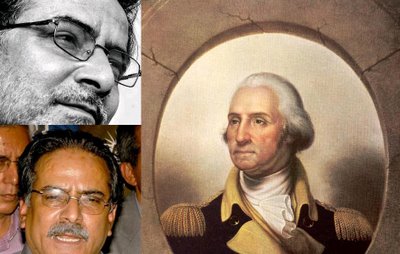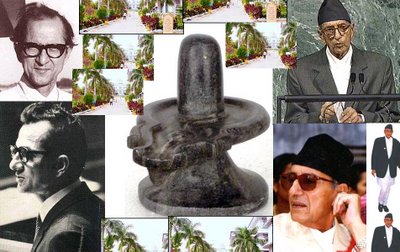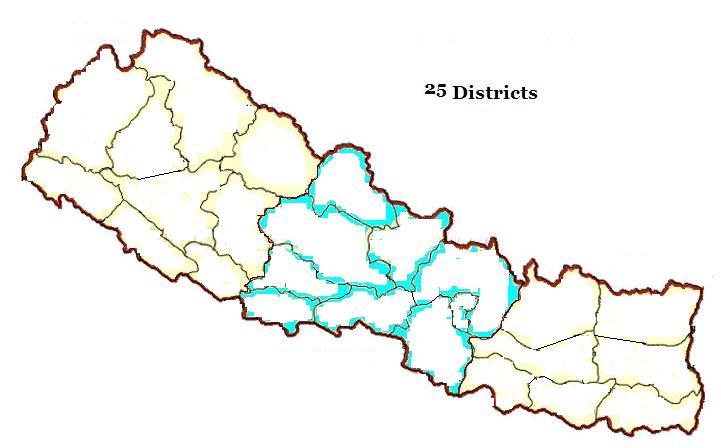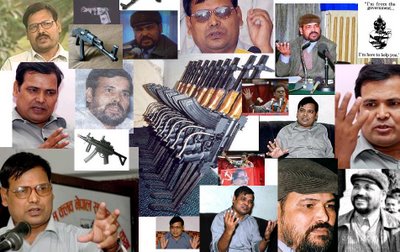
If Girija Koirala insists on staying on as Prime Minister and party president, if he keeps refusing to do the concrete homework that is required for party unification, and if he keeps uttering his commitment to a ceremonial monarchy, the Maoists are going to emerge the largest party in the constituent assembly.
The Maoists are the most likely to come up with a 50-50, 30-30-30-10 formula for the interim parliament and government, as in they will send a whole bunch of women and ethnics into power. That will give them a sure edge.
The Maoists have a clear map for federalism. The seven parties don't. That gives the Maoists a huge edge.
Unless the two Congress factions unite around the slogan of a federal republic, and somebody in the second generation takes over, the Congress will be in a sorry shape in the constituent assembly.
And they need a map. What kind of federalism are they proposing?
All the left parties put together are going to have the simple majority they need to declare the country a republic.
Right now the Congress looks like a party in decline.
Many of the seven parties come across as singularly immune to new ideas. That applies to the Congress as well to the Sadbhavana.
The Maoists right now have wind behind their backs.
Girija seems to want to take the party down with him.
वीपी र िगिरजाको कहानी
Proposed Constitution
ANONYC: Proposed Constitution
Why Prachanda Wants Girija To Lead The Interim Government
The Virus Of The April Revolution
Nepali Congress Needs A Convention
Language Policy And University Of Pennsylvania
In The News
Prachanda and the Corporate Convergence in Khatmandu Dissident Voice, CA
Nepali guerillas form taskforce to decide representation in ... People's Daily Online, China
Nepali guerillas holding central committee meeting
Nepal - Why Prachanda Wants Girija To Lead The Interim Government Citizen Journalism Nepal, NY
Deuba for continuation of Koirala as PM
PM, Prachanda discuss peace agreement Gorkhapatra, Nepal
Prachanda renounces armed struggle Hindu, India
Prachanda: Our Revolution Won L'Espresso, Italy Our revolution has not been completely victorious as yet. Changing the social economic structure and empowering the masses, in this sense, we have done an enormous amount and at the moment we are the main political force in the country. I think that we have achieved almost 60 percent of our goals , the remaining 40 per cent will be achieved with the election of the Costituent Assembly ..... I think that Maoist party will be supported by more than 50 percent of the country. Overall the democratic, republican, radical and left forces will gain more than 75 per cent of the vote ....... the CIA may conspire against our movement, we are serious and we are prepared for anything ...... if we Maoists win the elections, we will naturally claim the presidency of the Republic ......... personally I'm not really interested in becoming president ..... What I want do to do is to change the entire socioeconomic system in our country, but not with myself in government or as the president ....... We want to have a federal style of government with 9 or 10 autonomous regions. In the mean time our priority will be a revolutionary land reform. ....... our understandings standpoint is different from any communist party in the world. We are trying to interpretate marxism according to the needs of 21 st century and we are debating this with the socialist, communist and leftist movements all over the world. This is important not just for South Asia, but for the masses throughout the planet ......... We are not dogmatists, we are not sectarians, we are not traditionalists. We want to be ever more dynamic, adapting to our environment, understanding modernity ......... When we are in the government, our experiment will surprise everybody. ...... We are fighting not only for Nepal but for the masses of the entire world. We need help and the contributions from everybody ......... We changed our name several times in the past, before the Peoples War. We can change name according to the situation, there is no dogmatism about it. ........ We have resorses for hydroelectric power, thanks to the large amount of water coming off the Himalayas. Tourism could also create enormous income for us, thanks to our marvellous mountains, our historical and religious sites and our astonishing natural parks. Not to mention our agriculture, the land in Terai is potentially very fertile With good government we can become one of the richest country in South Asia. But we need transport, hi tech and scientific projects, infrastructures, and a lot of courage. In ten years we'll change the whole scenario, rebuilding this country to prosperity. In 20 years we could be similar to Switzerland. ....... we will welcome foreign investors ..... I lived in the capital for more than 10 years, then I moved to the mountains, when the Peoples War began ....... in the Peoples Army there are Hindus, Buddhists and others, and we respect all the religious beliefs of the masses ...... I read Indian and American literature, and obviously I read a lot of political newspapers from all over the world ........ my favourite was "Spartacus", you know? An historical movie by Stanley Kubrik, with Kirk Douglas, about a revolution by slaves in Ancient Rome
Koirala Will Lead Nation Till CA Polls: Prachanda Himalayan Times, Nepal
People's verdict will be respected: Prachanda Maoist mass meeting ... Gorkhapatra, Nepal
Prachanda renounces armed struggle Zee News, India
Richard Boucher to visit Nepal on Wednesday Times of India, India
Nepal`s Maoists in political makeover Zee News, India Our whole party organisation will focus on peaceful political process rather than war ...... Our party has already decided to dissolve the people's governments, local-level administration and our separate autonomous regions, among others
Yechury to attend signing of Nepal peace pact Monsters and Critics.com, UK
Pro-King MPs kept out of Nepal Parliament NDTV.com, India
World Food Programme Asks Nepal Truckers To Ease Strike Playfuls.com, Romania
Thousands of Child Soldiers Still Missing in Nepal Voice of America
IMF approves 21.2 mln USD payment for Nepal People's Daily Online, China
Korean Air launches Flights to Nepal and Charter Service to ... ASIATravelTips.com, Thailand
Verdict on Khum Bahadur’s Graft Case Likely Today Himalayan Times According to the CIAA, Khadka, currently an MP of the sitting parliament, had accumulated Rs 27.5 million without justifiable sources of income.
Minister for Immediate Declaration of a Republic State Chaudhari said that though the recent peace accord was historic, it lacked any word to console the voices of the indigenous people, women, Dalits and the Madheshis. ..... Jog Mehar Shrestha, the vice-president of Rashtriya Prajatantra Party, said the party would not create any obstacle if people's voice is for republic.
Rayamajhi panel indicts King Rayamajhi has found King Gyanendra guilty of suppression and killing of people during Jana Andolan II ...... named some security personnel for ordering the shooting of demonstrators and decided to recommend prosecution of them on charge of murder
Govt briefs donors on peace plan, seeks Rs 5b sought donor assistance in four major areas including infrastructure development of Maoist cantonments, relief and rehabilitation packages for internally displaced peoples (IDPs), strengthening internal security including re-establishment of over 117 police posts and additional expenses for holding the constituent assembly elections. ...... SDC, EU, Japan International Cooperation Agency, German GTZ, World Bank, ADB, USAID
Joint team inspects proposed cantonment sites in Surkhet, Kailali NepalNews
Abandoned IDEs and Landmines: Citizens’ lives still at risk
Congress establishment delaying party unification process: Deuba
Election Commission to prepare voters' list
Nepal: Can We Ever Reconcile Our Relative Truths?
Govt seeks donor assistance for rebel cantonments, CA poll Kantipur
Failure to agree could have been catastrophic: Mahara
Nepali students in US up by 25 percent
Govt-Maoist-UN team inspects Kailali, Surkhet PLA cantonment sites
3-day NC-D gathering begins in capital The party's current parliamentarians, ex-MPs, central members, ex-central members and district chairpersons of all 75 districts are attending the gathering that is taking place at the Birendra International Convention Centre in Kathmandu...... accusing the party leadership of being indifferent to the issue of Congress unification, the party members stressed the need for expediting the party unification process.
Boucher, Yechuri arriving Wednesday
Wanted’ man at TIA
Maoists threaten UML, NC men
‘No discussion on Koirala alternative’
19 still held in Maoist ‘jail’
'Hats off to people of Nepal, we must learn from you' Leaders representing Pakistan, Myanmar, Bhutan, Bangladesh and Kenya ..... Ali said, "People of Bhutan, Pakistan, Bangladesh, and Myanmar must learn a lesson from Nepal." ......Dr Tint Swe of Myanmar's National League for Democracy congratulated Nepal for achieving such a mammoth success. Swe, who has been fighting to instate democracy in Myanmar for the last 15 years, questioned, "Is not this possible in Myanmar as well?" ...... Nepal's success has convinced everyone around the world that if people unite, even the strongest of the oligarchy can be forced to kneel down. ...... "I salute people of Nepal on behalf of all the Kenyans and African countries," said Yahukara, adding, "The world has witnessed your (people of Nepal) victory and taught a lesson to the whole world."



